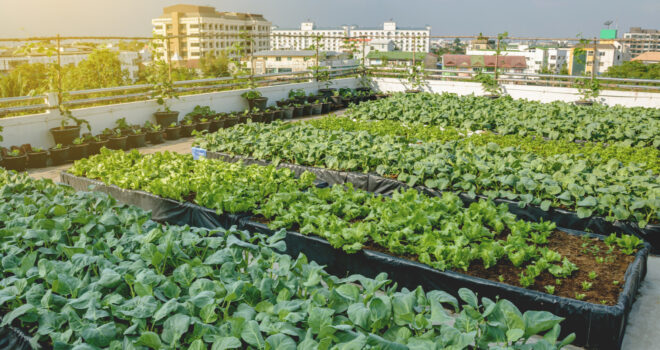Whereas urban farms were long excluded from the city, you now see them all over Montreal. They occupy the city’s forgotten spaces, such as its roofs, and actively contribute to its economic development.
As you walk through the streets of Montreal, you will frequently spot vegetable gardens, fruit trees or even vineyards in back gardens. More than 800,000 people in the city practise urban agriculture, in other words a whopping 42% of the population!
While the urban farming movement has gained momentum today, this was not always the case…
Disappearance of urban farms in Montreal
Following the acceleration of urbanisation and industrialisation, farms were forced out of the city to the fringe, to make way for buildings. Another element that contributed to the disappearance of agriculture in Montreal was the 1967 International and Universal Exposition, which was held in the Canadian city. In an effort to be perceived as modern and future-oriented in the eyes of the rest of the world, the city enforced certain rules banning all farm animals from the city.
Farming only returned to the city at the end of the eighties, when the first farm returned to the city.
Precursors and pioneering projects
The Lufa farms, which were established in Montreal in 2009, were the first commercial rooftop greenhouses in the world! Thanks to their cutting-edge technology, these farms now produce over 200 tonnes of fruit and vegetables, which are distributed in the form of baskets.
In addition to this, the number of farming initiatives in the city also multiplied quickly. Montreal is simply teeming with innovative and creative farming projects, including one involving oyster mushrooms, which are grown using the city’s waste, and honey, with production exceeding 11 tonnes/year.
Urban farming is gradually becoming a very tangible economic activity. Urban farms look for vacant spaces, such as rooftops, and thus avoid occupying built-up space. The authorities, which were once so eager to push farmers out of the city, are now implementing a large number of strategies to promote the development of these urban farms. Will Montreal one day be self-sufficient in the production of certain foods? Time will tell.



 Bell pepper
Bell pepper  Artichoke
Artichoke  Vegetable garden: sweet potato
Vegetable garden: sweet potato 









